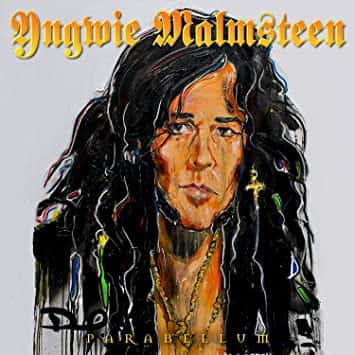Yngwie Malmsteen burst onto the music scene in the early ’80s and forever changed the landscape of rock guitar. He is back with a new record, Parabellum, and recently took some time to talk about it and look back over his career.
Please press the PLAY icon below for the MisplacedStraws.com Conversation with Yngwie Malmsteen.
On whether the timing of the record was impacted by the pandemic – Well, yes, and no. Because I already started playing around with some songs, but I had a world tour booked in 2020. Once they said, “No we have to delay the gigs for a couple of months”, I said, “Okay, I’ll start working in the studio a little bit”, and then that turned off and half basically. So here’s what happened, once I realized that there is going to be nothing but studio work for a while, it was actually kind of interesting in a way because I had to kind of like time myself with it. Because if I spend too much time on something, I feel it can get a little stale. So I don’t do that. I just try to capture the moments, the inspired moments that were really the magic moments almost. So almost a year in the studio that was almost like a hundred things that came up with so the ten tracks here are like the creme-de-la-creme of just like the best of the best of what I came up with for a year. So I used the time for detailing the arrangements and harmonized everything and think a little bit more about melodies and stuff like that and arrangements. But with the moments that could happen when you create something that’s time or no time, it just happens when it happens.

On his approach to composing – Here’s how it works. What a lot of people might not know is that the great composers, Mozart, Bach, Vivaldi, Paganini, all of them, they were improvisers and they would improvise on their instruments. In other words, improvisation is the genesis of composition and improvisation where they would just play freely on the instrument. Melodies and themes and pieces came up, they got inspired and they wrote them down, it’s as if I hit record, same thing. So they had to write something down… So basically the way I work is I always improvise, from day one. That’s all I’ve been doing. When I improvise something happens. Something comes out, “Wow, was that?” And I have to record it or write it down if I don’t have a recorder and that becomes a beginning of an idea, a theme for instance. Then sometimes when something like that happens and becomes very inspirational, I build on it by sitting down and just building on it, too. But the original ideas and melodies are almost always spur of the moment and contain these things which to me, that’s the magic of everything. I don’t want to sound cocky or something like that, but right now, I can sit down and write you a country song or a death metal song or a reggae song, or classical piece. I can do that right now. Because I have the knowledge of how to put notes together, I can do that. No problem. But to me, that’s not the true magic. So I kind of wait, almost wait for the real magic to happen. Then I make that into something that I probably use on an album.
On sequencing a record – I played guitar for since forever, and I’ve written pieces since forever so I don’t have outside inspiration influence. I don’t get influenced by radio or TV, nothing makes me think, “Oh not do that”, or, “I want to make a record like that”. So I don’t do that when I put together an album either. But what happens is that after let’s say a couple of months in the studio, I’ll put it back together. So you know I’ll have this many songs like this, this many instrumental songs, whatever, and you start thinking of assembling it so that it flows well as one unit. We must make albums, that’s very important to remember, even though they released two singles from this album. I make albums. I would love for whoever wants to hear this, listen to it whole, from the beginning to end because I think like that. It’s almost like you go to the movies and you see two scenes and think, “That’s good, I have to go now”.
On the cover art to Parabellum – Well, it was my wife’s ides definitely. I love the idea so I said, “Yes”. She said, “We should have a painting of you and auction out the artwork for charity”. We have a charity for foster children, it’s called April Way Children’s Foundation and we’re gonna do that.
On getting his start – I was a very established musician in Sweden long before I came to America. My so-called bands were me on lead guitar and lead vocals and I had a drummer and bass player, and probably five hundred drummers and five hundred bass players. When I was very young, ten, eleven years old, I would form bands and so when I was eighteen as I sent a cassette into Guitar Player Magazine and they invited me to come to America, basically, which was kind of strange thing for me then because nobody else done that. So, my career in America is one thing, which is worldwide of course, thank you. I was very, very, very, very active, many years before that. So it needs to be noticed. I was always a solo artist, always…Yes, I (saw Steeler and Alcatrazz as stepping stones). I was very cunning. I knew exactly what I was doing. I knew that for me to get the exposure I need to expand the markets that I was in. Steeler, that was an interesting concept because it wasn’t anything that I (liked). I really like the music in that. But, I think it was a necessary step. Then Alcatrazz…(phone connection was lost) next the next morning I get a phone call from somebody who said he works for Graham Bonnet. So he said, “We will audition you”. That’s two auditions in one day. So I went to see the people from Graham Bonnet’s thing there and they were really goofy, didn’t have any songs, didn’t have anything. The drummer had a cast on and couldn’t play drums. So they said, “Okay, you got the gig, you got the gig”, they were really excited so I said, “Let me think about it, I call you back”. I’m nineteen years old and I told them, “I’ll call you back”. I went to see Phil Moog, he was super nice, but he was frazzled. I think he was going through some sort of stuff then. So I called from Phil’s house and said, “Okay. I’ll join your band, but a couple of conditions. I write the songs and we get another drummer”. (The said), “Okay, okay, okay”. Alcatrazz wasn’t meant to be my thing but it certainly was.
On picking people for his band – I would like to make this very clear to everybody. No one ever told me what to do ever, okay? Even though it wasn’t my band, in Alcatrazz I told them who was going to be in the band. In my solo career, the background musicians that I picked, that I pay the salary to, were my choice to hire and fire and there was never anybody else involved with that and there never was ever. There still isn’t. So I’m perfectly in control over that.
On whether there is a record that defines the Yngwie Malmsteen sound – I don’t think like that because first of all, I don’t look back, I look forward, and secondly, I’d like to make it very clear because there seems to be some sort of misunderstanding. In 1984 I signed a solo deal with Polygram Records. I like to emphasize the word solo deal. The people that are hired, the play on my records and go on tour with me were hired people that got a salary. They didn’t write any music, they didn’t produce any music, they didn’t add anything, they didn’t give anything to the situation. It was just something that back then that I did. Honestly, I don’t want to be sounding the wrong way or nothing like that, but I don’t remember who was in the situation at one point, because it doesn’t matter to me. What matters to me, first of all, is the now and the future. That was the same way then too, and obviously, every record ever made, I tried to make it the best one I could. There’s no doubt about that. I wouldn’t say I didn’t but I feel very strongly that believing you learn and you mature and you learn how to put things together and stuff like that. But I always did everything myself so it doesn’t really matter who was hired to play the backing or singing. It was irrelevant for what I did.
On reissuing old records or playing them live – To reissue an album, that sounds like a good idea, but I never understood that concept of (playing) an album end to end. Because what I do, when I go on stage, I always play whatever is the newest thing I’ve done, but I always play whatever you call the classics, “Far Beyond the Sun”, “Black Star”, all that stuff, I always play them. So, to play any of those albums from start to finish, I never understood that concept. I don’t say never for anything. I can consider many things, but it doesn’t seem like a good idea to me.
On never working with anyone in a band – You said, “Bands that I work with”, there’s a fundamental misunderstanding there. Let’s understand. First of all, it’s never a band and I never worked with them. Never, I never did. It seems to me that’s a lot of people are popular saying, “I worked with him, I worked with him”. No, you didn’t. You worked for me, big difference. Who was the bass player in Frank Zappa’s band in 1967? It’s the same thing. It’s a little frustrating sometimes that people just don’t seem to get it. It was never a band. Since 1984 it was Yngwie Malmsteen. I’m not saying it to be arrogant, I just want to be correct.
On the Rock & Roll Hall of Fame – To be honest with you, I have a lot of awards and so on. They’re really nice and every I really appreciate them but it doesn’t really validate me for me. It doesn’t tell me one way or the other month. I am extremely self-critical. Extremely picky about what I do. So if I’m in that particular one, I’m in a lot of other ones. I mean, I can’t remember all of them, a lot of different things, many halls of fame and awards and it great. Very nice. I appreciate it. I don’t spend any time at all thinking about that. So it’s, of course, really nice if it happens. But it’s not something. I think about much.

1 Comment
What remarkable topic